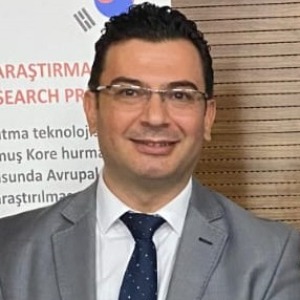Dipak P Ramji, Cardiff University, United Kingdom
Atherosclerosis, a chronic inflammatory disease of medium and large arteries, is the leading cause of myocardial infarction and cerebrovascular accidents, accounting for more global deaths than any other condition. Although lifestyle modifications and pharmacotherapies have reduc [....] » Read More
















Title : Overcoming manufacturing challenges in next-generation probiotics: From anaerobic cultivation to clinical-grade formulation
Jason Ryan, Sacco System, Australia
Next-generation probiotics (NGPs), consisting of non-traditional commensal microorganisms with targeted health benefits, are at the forefront of microbiome-based therapeutics. Unlike conventional probiotics, NGPs such as Faecalibacterium prausnitzii, Bacteroides xylanisolvens, Al [....] » Read More
Title : Global regulatory trends on the use of probiotics and prebiotics in foods and food supplements
David Pineda Ereno, DPE International Consulting, Belgium
The global market for probiotics and prebiotics continues to grow with increasing consumer demand over the years. Consumers have become more health conscious than ever. Consumer demand internationally is expected to increase further helping individuals meet their optimum health g [....] » Read More
Title : Treating irritable bowel syndrome patients with a balanced multi-strain synbiotic–results from a multi-center, randomized, double-blind, placebo-controlled clinical trial (the ViIBS trial)
Henning Sommermeyer, Calisia University, Poland
Effects of a balanced multi-strain synbiotic in patients with moderate to severe irritable bowel syndrome (IBS) of all stool form types were characterized in a multi-center, randomized, double blind, placebo-controlled clinical study. A total of 202 adult IBS patients were random [....] » Read More
Title : Results from a cross-sectional observational study examining irritable bowel syndrome patients six months after finishing their participation in the ViIBS trial
Jacek Piatek, Calisia University, Poland
A recent clinical (ViIBS) trial investigating the effects of a balanced multi-strain synbiotic in irritable bowel syndrome (IBS) patients showed that twelve weeks of treatment resulted in significant improvements across all major IBS symptoms. The current observational study purs [....] » Read More
Title : A case-cohort study of the outcomes of probiotics on wound healing in a private hospital in Abu Dhabi
Najat Amharar, Burjeel, United Arab Emirates
Introduction: Multidrug-resistant micro-organisms are a growing concern in the United Arab Emirates (UAE), with a rate of multi-resistant Staphylococcus Aureus (MRSA) of up to 26,4% according to latest estimates (1). This involves the community as well the more specific populati [....] » Read More
Title : Gut commensals-derived succinate impels colonic inflammation in ulcerative colitis
Rajdeep Dalal, Translational Health Science and Technology Institute (THSTI), India
Ulcerative Colitis (UC) is a relapsing-remitting inflammatory disorder of the gastrointestinal tract driven by complex interactions between the gut microbiota and dysregulated mucosal immune pathways. In this study, we identify microbiota-derived succinate as a key metabolic driv [....] » Read More
Title : Innovative applications of probiotics on anti-aging and its molecular mechanisms
Shoukat Parvez, Kyung Hee University, Pakistan
Health benefits of probiotics have been established by several studies in animals and humans and the scientific literature shows that the clinical uses of probiotics are broad and are open to continuing evaluation. Aging is a natural process that we cannot avoid, so probiotics [....] » Read More
Title : Microbial identification of kefir grains and its antimicrobial effect on gastrointestinal pathogens
Sheikh Saba Naz, Jinnah University for Women, Pakistan
Background: The rising occurrence of Gastrointestinal (GIT) cases and antibiotic resistance underscore the critical need for effective alternative therapies. Kefir, a fermented dairy product derived from Kefir Grains (KGs) demonstrates varying antimicrobial spectra based on its g [....] » Read More
Title : Evaluation of the immunomodulatory role of butyrate in macrophages infected with Paracoccidioides brasiliensis
Euller Fernandes Lopes, University of Brasília, Brazil
Introduction: The microbiota, composed of bacteria, archaea, fungi, and viruses, constantly interacts with the host in a symbiotic and dynamic relationship, performing essential functions for the maintenance of homeostasis. Among its functions is the fermentation of dietary f [....] » Read More
Title : From microbiota to medicine: Therapeutic promise of lactiplantibacillus plantarum derived postbiotics for cardiovascular health
Fadime Kiran, Ankara University, Turkey
Postbiotics, defined as bioactive metabolites produced by probiotics that confer health benefits, have increasingly attracted attention owing to their antioxidant, antimicrobial, and immunomodulatory properties. These attributes render them promising candidates for the prevention [....] » Read More
Title : Vaccine adjuvant potential of exopolysaccharides from pediococcus pentosaceus EIR/HM-1 as a novel immunostimulatory agent
Fadime Kiran, Ankara University, Turkey
Recent studies have increasingly emphasized the immunomodulatory potential of Exopolysaccharides (EPS) derived from probiotic bacteria, identifying them as promising natural, biocompatible, and effective candidates for immune modulation. In the present study, we investigated the [....] » Read More
Title : Functional and probiotic characterization of lactiplantibacillus curvatus isolated from the dolphin gut microbiota
Hazal Kibar Demirhan, Ankara University, Turkey
Conventional probiotics are typically derived from a narrow spectrum of microbial species, which may inherently limit the diversity of their functional attributes and mechanisms of action. Conversely, microorganisms isolated from hosts adapted to extreme environments often exhibi [....] » Read More
Title : Exploring psychobiotics from human breast milk: A new frontier in mental health promotion
Anagha M, M S Ramaiah Institute of Technology, India
Depression and anxiety are the most common mental health ailments in the world, occurring in approximately 5% of cases of adult depression. Both pharmacotherapy and psychotherapy treat these ailments widely, but their side effects cannot be overlooked. The gut-brain axis, a highl [....] » Read More
Title : Genomic structure and probiotic potential of megasphaera elsdenii CH4: A promising candidate for cattle supplementation
Tshifhiwa Paris Mamphogoro, Agricultural Research Council-Animal Production, South Africa
Probiotics are widely used in the prevention and treatment of infectious diseases, primarily through the modulation of immune and physiological systems. This study analysed the genomic structure of Megasphaera elsdenii CH4, a probiotic strain isolated from the rumen of a Holstein [....] » Read More
Title : Lactobacillus acidophilus modulates the gut microbiota and ameliorates features of MASLD in an obese diabetic mouse model
Hee Jin Park, Hallym University, Korea, Republic of
Background: Metabolic dysfunction-associated steatotic liver disease (MASLD) and type 2 diabetes (T2D) are among the most prevalent metabolic disorders worldwide. Increasing evidence suggests that alterations in the gut microbiota are key contributors to their development. This s [....] » Read More